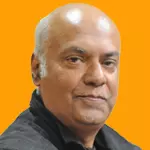
- Home
- India
- World
- Premium
- THE FEDERAL SPECIAL
- Analysis
- States
- Perspective
- Videos
- Sports
- Education
- Entertainment
- Elections
- Features
- Health
- Business
- Series
- In memoriam: Sheikh Mujibur Rahman
- Bishnoi's Men
- NEET TANGLE
- Economy Series
- Earth Day
- Kashmir’s Frozen Turbulence
- India@75
- The legend of Ramjanmabhoomi
- Liberalisation@30
- How to tame a dragon
- Celebrating biodiversity
- Farm Matters
- 50 days of solitude
- Bringing Migrants Home
- Budget 2020
- Jharkhand Votes
- The Federal Investigates
- The Federal Impact
- Vanishing Sand
- Gandhi @ 150
- Andhra Today
- Field report
- Operation Gulmarg
- Pandemic @1 Mn in India
- The Federal Year-End
- The Zero Year
- Science
- Brand studio
- Newsletter
- Elections 2024
- Events
- Home
- IndiaIndia
- World
- Analysis
- StatesStates
- PerspectivePerspective
- VideosVideos
- Sports
- Education
- Entertainment
- ElectionsElections
- Features
- Health
- BusinessBusiness
- Premium
- Loading...
Premium - Events

Sports and film stars blithely promote illegal betting sites, blurring line between gaming and fantasy gaming companies; regulation and transparency are critical
There is a game within a game. Accompanying the fizz of the Indian Premier League (IPL) is a worthy companion – the country’s great Indian online betting boom.
IPL 2024 saw a record-breaking 510 million viewers tune in for the first 51 matches on Star Sports, marking a 5 per cent increase compared to the previous high in 2019 for the same number of games and an 18 per cent increase in total watch time. The total TV viewership touched 546 million for 67 matches while JioCinema set a streaming record with over 620 million viewers.
The Chennai Super Kings (CSK) Vs Mumbai Indians (MI) clash in IPL 2025 on March 23 became the most-watched IPL game ever on TV with 163 million live views. The opening weekend, across TV and digital, saw a total consumption of a whopping 5,000 crore minutes.
This scramble, however, is not just confined to TV viewing or packed, overflowing stadiums – it has also slipped into the virtual world, the world of gaming or betting. 'Gaming’ generally refers to the activity of playing games, particularly video games, on devices like consoles, PCs, or smartphones, either individually or with others, and can encompass various genres and purposes.
Disrupting fantasy gaming
The IPL is growing in revenue and finance — for the 18th season in 2025, JioStar, the official broadcaster, has set a revenue target of ₹4,500 crore, up from an estimated ₹4,000 crore earned across TV and digital platforms last year. With this, celebrity interest has spiked.
Also read: IPL online betting: Are cricketers in a way driving youth to gambling addiction, financial losses?
On March 21, former Indian all-rounder turned commentator Ravi Shastri promoted betting company Stake on X (formerly Twitter). Shastri wrote to his 2 million followers, “Witness the Ultimate Cricket Extravaganza. Early six? Early wicket? What’s your stake? @Stake”. However, his post came with a disclaimer – "This content is not intended for the Indian region".
By any reckoning, it is a ‘big deal’.
What Shastri and others like South African fast bowler Dale Steyn, former Indian opener Shikhar Dhawan and Bollywood movie star Emraan Hashmi do is promote illegal betting sites, blurring the line between gaming and fantasy gaming companies. The latter rely on skill and test the fans' cricketing knowledge.
Most of the illegal betting and gambling companies like India’s Fantasy (endorsed by Hashmi) advertise on cabs. Dale Steyn appears on Fun88 promotions in Metro compartments. Shikhar Dhawan, bat on shoulder, advertises for 1XBAT on a site called the Indian League Carnival.
It is indeed a carnival for illegal and betting sites operating out of the country, using Indian cricketers and movie stars to disrupt the fantasy gaming landscape.
Govt cracks down
All of this adds to the confusion of the unsuspecting consumers, blurring the lines between legit and illegal. Indian cabs and the Metro are considered credible means of advertising and the moment a popular face selling a particular product on an illegal betting site pops up, the fans are drawn in. Fun88, in fact, has a QR code on the Ad board inside the Metro, making access just a step away.
However, the government is doing its best to crack down on online betting and gambling sites and only recently, the Union minister Ashwini Vaishnaw in a written reply to the Lok Sabha said that the Ministry of Electronics and Information Technology (MeitY) had issued 1,410 blocking directions against such sites.
The minister also said that the government’s actions reflect a multi-pronged approach to regulating the online gaming industry. The blocking of websites and applications forms a critical part of the strategy, targetting platforms that operate outside the legal framework.
Also read | Dua Padukone Singh | Why are celebrity babies expected to serve as cultural icons?
Beyond mere regulatory evasion, illegal gaming platforms pose a significant threat to India’s consumer interests. These operations siphon vast sums from the economy, with estimates suggesting annual losses exceeding Rs 2 lakh crore ($24 billion) in potential tax revenue from a Rs 8.2 lakh crore ($100 billion) market, according to a report in 2023 by independent Indian think tank, Think Change Forum.
Worse, operating outside legal frameworks, they facilitate money laundering and expose users to rampant data theft, financial fraud, and identity breaches due to a complete lack of data protection. Compounding the issue, aggressive social media campaigns often obscure the line between legitimate gaming and illegal betting, confusing consumers.
Glimmer of hope
However, a glimmer of hope has emerged with the recent MoU between the Advertising Standards Council of India (ASCI) and key gaming industry bodies like FIFS (Federation of Indian Fantasy Sports), AIGF (All India Gaming Federation), and EGF (E-Gaming Federation).
Also read: Madhya Pradesh: IPL betting racket dismantled in Indore, 8 arrested
It's crucial to acknowledge that legitimate gaming companies are not just beneficiaries of the IPL's popularity; they are also vital contributors to the broader sports economy. They are the backbone of numerous cricket series and team sponsorships, providing essential financial support that fuels the sport's growth.
Beyond sponsorships, they create opportunities for emerging talent, offering platforms to showcase their skills and gain recognition. Most importantly, these companies forge a deep engagement with the hundreds of millions of Indians who passionately follow cricket, enhancing the fan experience and solidifying the sport's cultural significance.
Symbiotic relationship
The IPL has evolved into a self-contained universe, its popularity and sparkle intensifying with each passing year. Gaming companies amplify this spectacle, igniting the stadium atmosphere hours before the first ball is bowled.
Also read | World Siblings Day: Meet the lesser-known brothers/sisters of Indian celebrities
It also has a cascading effect on the gaming industry. India’s online gamer base in 2024 expanded to 488 million plus, with an addition of 33 million new gamers, including both casual and real money gamers, across all devices. More than 155 million gamers engaged with real money gaming (RMG) sub-segments such as fantasy sports, rummy, poker, and other transaction-based games, registering a 10 per cent year-on-year growth.
The IPL’s success, if looked beyond the playing arena, also brings challenges, responsibilities and expectations. It masks underlying problems, particularly the unfair burden placed on gamers to discern between authentic and deceptive platforms.
By fostering a regulated and transparent environment, it will be easier to ensure that this symbiotic relationship between gaming and cricket continues to thrive, benefiting both the industry and the economy.
(The Federal seeks to present views and opinions from all sides of the spectrum. The information, ideas or opinions in the articles are of the author and do not necessarily reflect the views of The Federal.)


